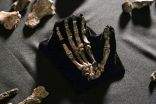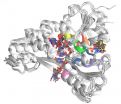How genetic testing can improve care for children with epilepsy
2015-09-10
(Press-News.org) The steps involved in evaluating and diagnosing patients with epilepsy are complicated. In a new and extensive literature review of available information, experts provide insights on the valuable role of genetic testing in the diagnosis and care of pediatric epilepsy.
Epilepsy is a common neurological disorder that affects up to 1.5% of the world's population and is more commonly diagnosed in children than adults. Most cases of epilepsy have been considered "idiopathic" or of unknown cause, but recent advances in genetic testing are providing insights on the potential significance of certain genes.
"If a genetic disorder is suspected as the cause of treatment resistant epilepsy, timely diagnosis with appropriate genetic tests may reduce costs, limit anxiety to families, and optimize treatment and care," said Dr. Anup Patel, senior author of the Epilepsia study.
INFORMATION:
ELSE PRESS RELEASES FROM THIS DATE:
2015-09-10
In a modern, multicore chip, every core -- or processor -- has its own small memory cache, where it stores frequently used data. But the chip also has a larger, shared cache, which all the cores can access.
If one core tries to update data in the shared cache, other cores working on the same data need to know. So the shared cache keeps a directory of which cores have copies of which data.
That directory takes up a significant chunk of memory: In a 64-core chip, it might be 12 percent of the shared cache. And that percentage will only increase with the core count. Envisioned ...
2015-09-10
MADISON, Wis. -- Working in a cave complex deep beneath South Africa's Malmani dolomites, an international team of scientists has brought to light an unprecedented trove of hominin fossils -- more than 1,500 well-preserved bones and teeth -- representing the largest, most complete set of such remains found to date in Africa.
The discovery of the fossils, cached in a barely accessible chamber in a subterranean labyrinth not far from Johannesburg, adds a new branch to the human family tree, a creature dubbed Homo naledi.
The remains, scientists believe, could only have ...
2015-09-10
Bethesda, MD (Sept. 10, 2015) --All colorectal cancer patients should undergo tumor testing to see if they carry Lynch syndrome, the most common inherited cause of colorectal cancer, according to a new guideline1 published in Gastroenterology, the official journal of the American Gastroenterological Association.
"Approximately 50,000 Americans are expected to die from colorectal cancer this year, and hereditary syndromes account for a small, but important fraction of those diagnoses," said Joel H. Rubenstein, MD, AGAF, lead author of the guideline, research scientist ...
2015-09-10
A new study of more than 500 Black and Latino college students has confirmed that many encounter obstacles after enrolling in college without adequate financial resources.
"Students were surveyed in the fall, winter and spring of freshman year," said Micere Keels, associate professor in comparative human development at the University of Chicago, who led the study. "At each time-point, approximately 35 percent reported having difficulty paying their bills, being upset that they did not have enough money and being concerned that they would not be able to afford to complete ...
2015-09-10
Amsterdam, September 10, 2015 - Surgery to remove the breasts of women at increased risk of developing breast cancer may not be necessary in the future, according to research published in EBioMedicine. Two new studies looking at the effect the menstrual cycle has on the development of breast and ovarian cancer reveal alternative prevention strategies that may render surgery unnecessary.
Breast cancer is the most common cancer in women worldwide and ovarian cancer is the deadliest gynaecological cancer. Women who have inherited mutations in genes called BRCA1 and BRCA2 ...
2015-09-10
The discovery of a new species of human relative was announced today, 10 September 2015, by the University of the Witwatersrand (Wits University), the National Geographic Society and the Department of Science and Technology (DST) and the National Research Foundation of South Africa (NRF).
Besides shedding light on the origins and diversity of our genus, the new species, Homo naledi, appears to have intentionally deposited bodies of its dead in a remote cave chamber, a behaviour previously thought limited to humans.
Consisting of more than 1 550 numbered fossil elements, ...
2015-09-10
An accident waiting to happen: that's what an intoxicated driver is whose attention is further distracted by anything from a text message to dashboard controls. Such distractions are just too much to handle safely, even for people who drive while still within the legal alcohol limits, say Nicholas van Dyke and Mark Fillmore of the University of Kentucky in the US. Their study provides some of the first evidence on the degree to which distractions influence the ability of intoxicated drivers to safely control their vehicles. The findings are published in Springer's journal ...
2015-09-10
James Cook University scientists have played a role in a discovery that may alter the known history of humankind.
JCU's Professor Paul Dirks and Dr Eric Roberts were part of a team that explored the Rising Star Cave system in South Africa.
A chamber deep in the caves was found to contain multiple specimens of what is being called Homo naledi - an extinct, previously unknown species related to modern homosapiens.
Testing at JCU and the University of Johannesburg shows sediments in the chamber did not come from external sources, ruling out the possibility of flash ...
2015-09-10
Researchers at EMBL's European Bioinformatics Institute (EMBL-EBI) have developed a new method for studying the targets and effects of cancer drugs using data from discovery mass spectrometry (MS) experiments. The study is published in Nature Communications.
Understanding the biological signaling pathways that regulate metabolism and gene expression is challenging, because so many things are happening at once. But this understanding is crucial for knowing how a drug will affect healthy and cancer cells. Protein kinases play a pivotal role in these pathways by turning ...
2015-09-10
NS3 is an enzyme specific to the hepatitis C virus. If developed, a drug capable of recognizing and selectively attacking it could fight the disease without side effects for the body. However, to be able to develop one we need to know more about the behavior of this important protein in the virus replication process. Some SISSA scientists have provided a detailed and comprehensive view of the behavior of NS3. The study has been published in the journal Nucleic Acids Research.
According to the WHO, a good 140 million people are affected by hepatitis C (3/4 million new cases ...
LAST 30 PRESS RELEASES:
[Press-News.org] How genetic testing can improve care for children with epilepsy

